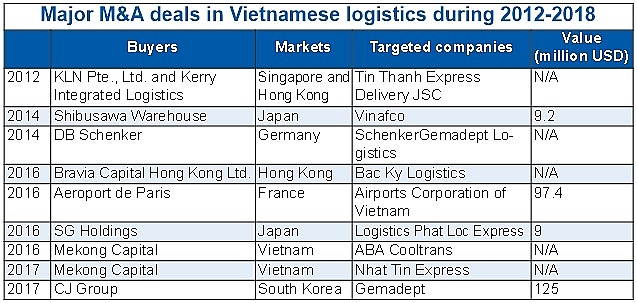Asian companies lead logistics M&A
 |
| Source: FiinGroup and Nikkei Asian Review |
According to the Vietnam Logistics Business Association (VLA), the local logistics market has witnessed two new mergers and acquisitions (M&A) deals with involvement of Japanese companies so far this year. They include one in which a Japanese company acquired a 10.1 per cent stake, and the other with a 30.3 per cent acquisition.
Nguyen Tuong, deputy secretary general of the VLA told VIR, “These cases are just among other new potential M&A deals expected to be reached between Japanese and South Korean companies, and Vietnamese partners in the future. Companies from countries such as these are leading the M&A trend in Vietnamese logistics, especially in the cold supply chain which remains weak. Therefore, they eye to expand these services across Vietnam, especially in the Mekong Delta and in the south in general.”
Furthermore, developing logistics services in Vietnam will enable foreign logistics companies to promote cross-border transport connecting China with the other ASEAN member countries, moving goods to Laos, Cambodia, Thailand, Malaysia, and Singapore by road, sea, and air. Most groups now have their manufacturing facilities in Thailand, Malaysia, and Laos, and they have to import spare parts and inputs from China.
The strong involvement of Japan and South Korean investors has reflected the typical characteristic of the M&A trend in the Vietnamese logistics market that has been dominated by Asian investors.
In the recent past, the majority of M&A deals in the Vietnamese logistics sector mainly involved businesses from Japan and South Korea. This momentum continues today, when a Japanese company is negotiating with a Vietnamese partner on stake acquisition to enter the market by developing cross-border transport services in the central region, according to the VLA.
“Overseas logistics companies choose M&A as it can help them lower costs – as local partners have already developed extensive business networks and have experience in the market – while giving the foreign partners an opportunity to own 100 per cent of the venture at a future date,” said Tuong.
Industry insiders attributed the trend to the rapid growth of Vietnam’s export-oriented manufacturing sector and strong inflow in international investment, as well as recent improvements in the legal framework.
According to the General Statistics Office, Vietnam’s trade turnover in the January-June period hit $245.48 billion, an all-time high for the six-month period. Total export turnover between Vietnam and ASEAN countries has increased seven-fold in the two decades since Vietnam became a member of the bloc in 1995.
In addition, the US-China trade tensions have prompted international corporations to shift their investment to Vietnam. Statistics from the Ministry of Planning and Investment showed that registered capital from Hong Kong led Vietnam’s total foreign direct investment (FDI) in the first half of 2019.
Also importantly the country’s Decree No.163/2017/ND-CP enacted in December 2017 concerning the removal of restrictions on the commercial presence of foreign investors in the logistics sector is forecast to give a push to the local market.
“In light of the incredible growth of the industry, the demand for logistics services will ¬surge, leading to ¬immense opportunities for business development,” said Vaibhav Saxena, lawyer at the Vietnam International Law Firm.
“With the removal of restrictions on the form of commercial presence of foreign investors, Decree 163 will considerably enhance the flow of FDI into Vietnam’s logistics, and encourage the sustainable development of this sector in all modes of transportation,” he said.
What the stars mean:
★ Poor ★ ★ Promising ★★★ Good ★★★★ Very good ★★★★★ Exceptional
Related Contents
Latest News
More News
- BJC to spend $723 million acquiring MM Mega Market Vietnam (January 22, 2026 | 20:29)
- NamiTech raises $4 million in funding (January 20, 2026 | 16:33)
- Livzon subsidiary seeks control of Imexpharm (January 17, 2026 | 15:54)
- Consumer deals drive Vietnam’s M&A rebound in December (January 16, 2026 | 16:08)
- Southeast Asia tech funding rebounds on late-stage deals (January 08, 2026 | 10:35)
- DKSH to acquire Vietnamese healthcare distributor Biomedic (December 24, 2025 | 15:46)
- Central Retail refocuses Vietnam strategy with Nguyen Kim exit (December 24, 2025 | 15:01)
- RongViet Securities wins sixth consecutive M&A advisory award (December 22, 2025 | 17:30)
- Kido Group divests from ice cream and frozen foods (December 18, 2025 | 16:49)
- Insurtech startup Saladin wraps up Series A funding round (December 17, 2025 | 09:10)

 Tag:
Tag:


















 Mobile Version
Mobile Version